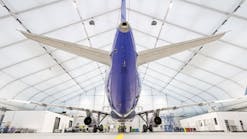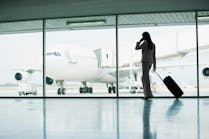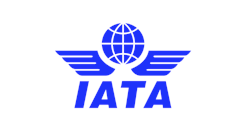Facial Recognition - Improving the Airport Passenger Journey One Face at a Time
Airports are always looking to improve their security, efficiency and the passenger experience, and since the pandemic, they are particularly looking to improve the health and safety of everyone in the airport.
Facial recognition is solving these challenges and improving the passenger journey, from check-in to duty-free and border control. By using this technology airports are responding to passenger demand and allowing them to stand out in the digitally connected world.
Check Out the Check-In of the Future
Customer service agents manually review documents at check-in. This time-consuming process reduces the efficiency of the check-in and impacts the passenger experience. The touch points involved also promote the spread of Covid and cost a huge amount to keep clean - which facial recognition technology completely removes.
Once enrolled into a biometric check-in program with your chosen airline, the only ‘documentation’ needed is your face. Airlines can manage all identification checks from uploaded documents, and either via an app or a check-in kiosk, the airline can match up the individual in front of a facial recognition system to a passport and subsequent booking. Your face becomes your boarding pass and totally removes the hassle and inefficiency of sharing physical documents.
Baggage - Just Drop, Don’t Stop
The speed and passenger experience of bag drop is improved with facial recognition. By creating a digital boarding pass based on your facial biometric data, bag drop kiosks can introduce systems to identify each individual allowing them to become fully automated kiosks.
The delays with sharing and checking boarding passes are drastically reduced, introducing a seamless passenger experience and improving the efficiency of the bag drop before flights.
Take Security to New Heights
Facial recognition can heighten employee security through the introduction of access control and personnel tracking, and due to the accuracy of modern facial recognition software. To Many, meaning unauthorized personnel cannot access secure areas within the airport. Implementing facial recognition into employee access control will therefore increase the security of the airport - no longer are unsecure ID cards or passwords needed.
CCTV and facial recognition allows for efficient security process implementation, incident prevention and rapid response. For example, you can plan the interception of the suspect/violator using their position tracking in real-time via CCTV and facial recognition engines.
Providing such a high level of security will likely go unnoticed by the passengers, however, it all comes together to provide a seamless and secure experience.
Get Straight to Your Pre-Flight Purchases
Whether it be a preflight lunch or stocking up on sun-tan lotion, thousands of travelers purchase items and food at duty-free or concessions before their flight. Passengers are required to share their boarding passes, and pay using a preferred method. VisionLabs’ LUNA POS Terminal can be used in concessions and duty-free instead allowing passengers to pay using their face. This removes two unnecessary, time-consuming, and experience diminishing processes from duty-free and concessions - the payment process and reviewing of boarding passes.
The rate at which cashiers can serve passengers is increased, having the knock-on effect of reducing queues. This has a direct business outcome as shorter queues mean more passengers are likely to decide to purchase products, as they know they have the time to do so.
More Time to Lounge Around
For those lucky enough to enjoy access to airline lounges, there are multiple touchpoints - handing over your ID, a boarding pass and a member card, and of course the handling of the germ-laden doors. These checks cause delays if multiple members wish to access the lounge at the same time - spoiling the VIP treatment experience.
Introducing access control and identification systems, facial recognition provides the seamless experience these members deserve. Facial recognition software can identify, and confirm/deny, an individual's biometric data in milliseconds even if they choose to wear a mask. This speeds up the access process and provides the ultimate passenger experience. It also ensures the security of all members inside the lounge, as non-members will not be able to pass the facial recognition access control.
Remove Boredom from Boarding
At this stage, passengers' passports and boarding passes are checked again - with another boarding pass check before you can enter the tunnel connecting to the plane. There are three touch points here that create delays and impact the passenger experience.
These touchpoints are removed by facial recognition. Passports and faces can be scanned simultaneously to check identities. This increases the level of security whilst also increasing the processing speeds. As facial data has also replaced the paper or digital boarding pass, your face will be scanned against this airline data at the same time, streamlining the process.
Passengers no longer need to rummage around bags and pockets for their passport and boarding pass, holding up a queue behind them when facial recognition is implemented. This drastically improves the passenger experience, increases the speed at which the plane can be boarded and allows other important checks to be carried out by airline staff.
No More Boring Border Control
At border control, documents are reviewed by a border agent - and sometimes supporting documents such as Covid-19 vaccination certificates. These reviews can cause long, and frustrating queues.
Facial recognition negates these touchpoints with access control stations. Passports are scanned as well as your face. Due to the speed of identification, and accuracy, of software this will improve the efficiency at which travelers can be processed through border control.
Facial Recognition Powers the Whole Passenger Journey
The whole passenger journey can be improved with the introduction of facial recognition software, however, this is not just about the passenger experience. The safety of the airport facilities will also be increased, due to the accuracy of modern facial recognition. In terms of direct business outcomes, facial recognition improves the efficiency of processing passengers across check-in, baggage, duty-free, at lounges and boarding. If airports wish to grow without investing in larger concourses, in more staff and kiosks, then facial recognition can enable much of this growth through its impressive processing speeds and accuracy.






